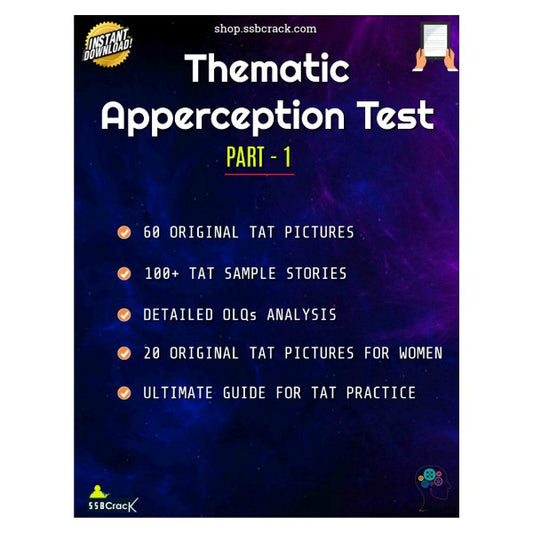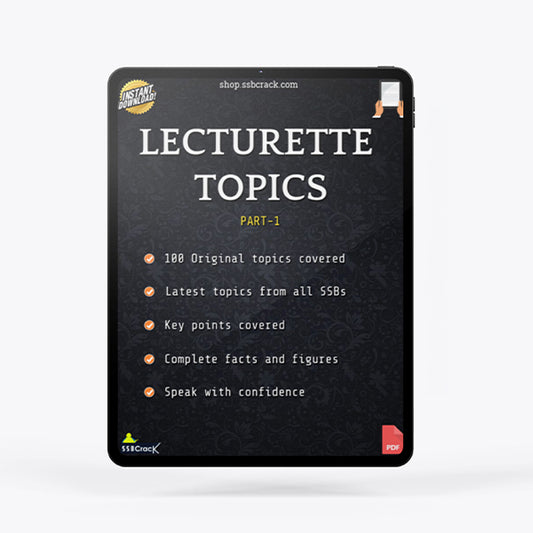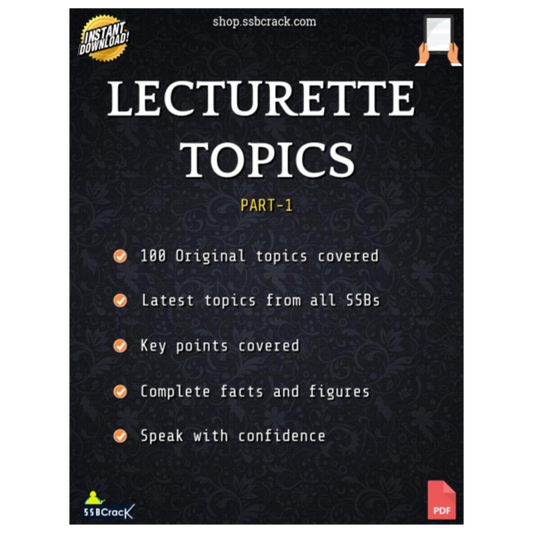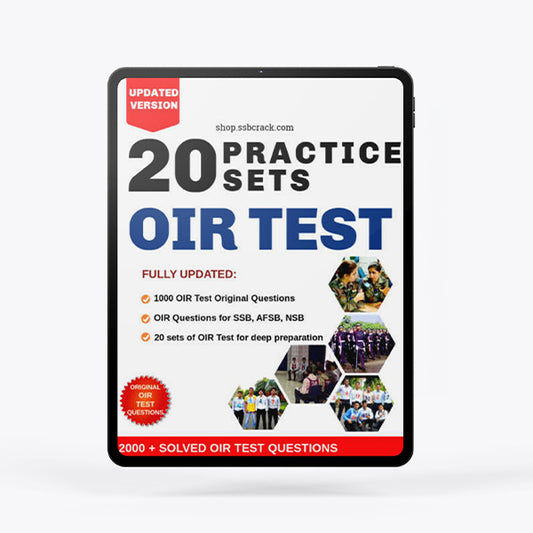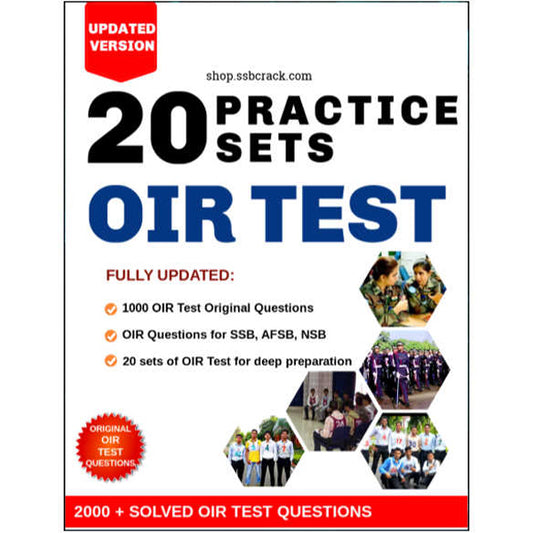20 SSB Interview Questions For Freshers With Answers
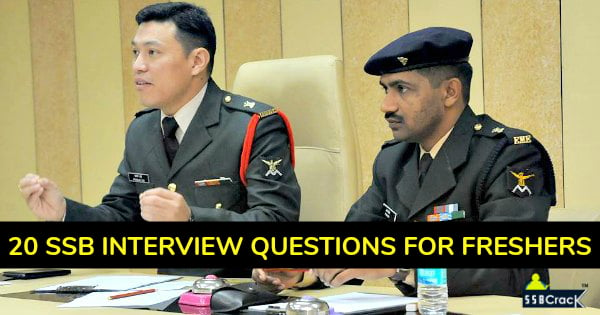
Preparing for the Services Selection Board (SSB) interview is a critical step for any fresher aspiring to join the Indian Armed Forces. This selection process is not merely a test of knowledge but also an evaluation of an individual’s personality, character, and potential to be an effective member of the defence forces.
Understanding the types of questions you may encounter can significantly enhance your preparation and boost your confidence. In this article, we will explore 20 key SSB interview questions, categorized appropriately, along with tips on how to formulate your answers effectively.
Also Read: 10 SSB Interview Questions For Repeaters With Answers
Introduction
The SSB interview process, a blend of psychological tests, group discussions, and personal interviews, seeks to identify candidates with the aptitude to thrive in the armed forces. Each interview session is designed to assess various attributes including leadership, teamwork, decision-making, motivation, and ethical reasoning. For freshers, being equipped with the right answers to likely questions can make a considerable difference, as these answers not only reflect knowledge but also showcase personality traits.
SSB Interview Books Power Pack: 4 Must Read Books for Defence Aspirants
Rs. 1,760.00
Sale price
Rs. 1,399.00
Let's Crack SSB Interview Book [Paperback]
Rs. 390.00
Sale price
Rs. 360.00
Breaking The Code of SSB Psychological Tests Book - SSB Interview (TAT/WAT/SRT/SD)
Rs. 390.00
Sale price
Rs. 360.00
OIR Test & PPDT Book - SSB Interview Screening Test - Stage 1 Testing
Rs. 490.00
Sale price
Rs. 375.00
For instance, according to the Defence Ministry of India, the SSB interview process involves over 250,000 candidates annually, with only a select few making the cut to join the military ranks. The preparation phase is thus imperative as it lays the groundwork for a successful interview performance.
Personal Background and Self-Description
The first set of questions typically revolves around personal background and self-description. These are designed to help the interviewers understand you better as a person.
Tell Me About Yourself
This open-ended question serves as your chance to present a comprehensive yet concise overview of who you are.
Answer Structure:
- Basic Information: Your name, educational background, and place of origin.
- Family Details: Brief information about family background.
- Hobbies and Skills: Elaborate on interests and any relevant skills.
Example Answer:
"My name is [Your Name], hailing from [Your Hometown]. I am an engineering graduate from [Your College], and I have always been passionate about technology and innovation. In my free time, I enjoy hiking, reading about military history, and volunteering at local NGOs. My leadership skills have been honed through various projects, especially leading my college’s tech team."
Why Do You Want to Join the Indian Military Forces?
A clear, motivating reason is crucial when answering this question. It reflects your dedication and determination.
Example Answer:
"I aspire to join the Indian Army because I believe it embodies the highest virtues of discipline, courage, and service to the nation. My family has a legacy of serving in the armed forces, and I want to contribute to this honor while developing my leadership skills and integrity."
What Are Your Strengths and Weaknesses?
Being honest yet strategic is essential in discussing strengths and weaknesses.
Example Answer:
"One of my key strengths is my analytical thinking, which allows me to approach problems methodically. However, I acknowledge that I struggle with procrastination, particularly when approaching substantial projects. I am actively working on this by setting clear deadlines and breaking tasks into manageable parts."
SSB Interview Study Material 2026 [ Pack of 17 eBooks ]
Rs. 1,313.00
Sale price
Rs. 499.00
Thematic Apperception Test (TAT) Part 1 eBook [100+ Stories]
Rs. 150.00
Sale price
Rs. 139.00
SSB Lecturette Topics Part-1 eBook [100 Topics]
Rs. 149.00
Sale price
Rs. 125.00
OIR Test eBook with 20 Practice Sets - [1000+ Questions Included]
Rs. 250.00
Sale price
Rs. 199.00
Family and Friends
These questions focus on your personal relationships and social conduct.
Describe Your Family Background
Your response should reflect your family dynamics and values.
Example Answer:
"I come from a close-knit family of five. My father is a retired army officer, and my mother is a school teacher. My sibling, who is also passionate about the armed forces, and I often engage in discussions about military strategies and current affairs, which strengthens our bond."
What Kind of Friends Do You Choose?
This question aims to understand your social preferences and values.
Example Answer:
"I gravitate towards friends who are supportive, honest, and intellectually stimulating. I believe in cultivating relationships that foster personal growth. My best friend, who shares my interests in outdoor sports and leadership activities, has been a consistent motivational force in my life."
Education and Extracurricular Activities
These questions focus on your academic background and additional pursuits outside the classroom.
Tell Me About Your Education and Extracurricular Activities
Here, you should illustrate your educational achievements and the balance between studies and extracurricular activities.
Example Answer:
"I completed my schooling from [School Name], where I excelled academically while actively participating in sports and music. In college, I was the captain of the cricket team and led my group to several inter-college tournaments. Additionally, I engaged in various leadership workshops, which further enhanced my organizational skills."
Current Affairs and General Knowledge
Your awareness of the world around you is often tested in this section.
What Are the Current Major National and International Issues?
Staying updated on global and national events is vital.
Example Answer:
"Currently, significant national issues include economic development and healthcare reforms. On an international scale, challenges such as climate change, regional conflicts, and the rise of technology in warfare are paramount."
Who Is the Current Chief of Army/Navy/Air Staff?
This question tests your knowledge of the military hierarchy.
Example Answer:
"The current Chief of Army Staff is General [Name], the Chief of the Naval Staff is Admiral [Name], and the Chief of the Air Staff is Air Chief Marshal [Name]. I believe staying informed about our defence leadership is vital for aspiring candidates."
Situational and Leadership Questions
This section evaluates how you would act in specific scenarios.
Describe a Situation Where You Displayed Leadership
Use specific past experiences to illustrate your leadership capabilities.
Example Answer:
"During my final year project, I was tasked with leading a team of five to create a sustainable energy model. I initiated regular brainstorming sessions and assigned roles based on individual strengths. The project won the 'Best Innovative Project' award at our university’s annual expo, which reinforced my belief in teamwork and effective leadership."
How Would You Handle a Conflict in Your Team?
Your approach to conflict resolution is evaluated here.
Example Answer:
"In case of a team conflict, my first approach would be to facilitate open communication. I would identify the root cause by speaking to each party and ensuring everyone feels heard, then guide them toward a collaborative solution that emphasizes our common goals."
Psychological and Behavioral Questions
These questions assess your response to stress and challenges.
How Do You Handle Stress and Pressure?
Your coping mechanisms in stressful situations reveal a lot about your personality.
Example Answer:
"I manage stress through a combination of physical fitness and mindfulness practices. I prioritize my tasks to avoid last-minute panic and ensure I allocate time for relaxation, such as yoga or reading, to keep my mind clear and focused."
What Motivates You to Achieve Your Goals?
This question seeks to understand what drives your ambitions.
Example Answer:
"My greatest motivation stems from a deep-seated desire to serve my nation and fulfill a legacy of integrity and valor. I also stay inspired by setting realistic, short-term goals that lead to bigger accomplishments, ensuring I remain focused and committed."
Future Plans and Backup Options
Interviewers often want to explore your foresight and flexibility with your aspirations.
What Would You Do If You Did Not Get Qualified in the SSB Interview?
Your response should reflect resilience and a plan for the future.
Example Answer:
"If I do not qualify, I will seek constructive feedback on my performance and work passionately to address those areas. Concurrently, I would consider pursuing a higher degree in [Your Area of Interest] to enhance my credentials while keeping the dream of serving in the armed forces alive."
Tips for Answering SSB Interview Questions
To maximize your chances of success in the SSB interview, consider the following tips:
- Be Honest and Authentic: Authenticity resonates with interviewers. They can detect insincerity.
- Back Up Your Responses with Examples: Personal anecdotes bolster your claims and portray your experiences vividly.
- Maintain Eye Contact: This builds rapport and conveys confidence.
- Speak Clearly and Confidently: Clear enunciation reflects your thought process and helps engage your interviewers.
- Stay Composed: Manage nervousness by practicing relaxation techniques before the interview.
- Practice Mock Interviews: Prepare thoroughly through simulated interviews, helping you articulate your thoughts and responses effectively.
SSB Interview Books Power Pack: 4 Must Read Books for Defence Aspirants
Rs. 1,760.00
Sale price
Rs. 1,399.00
Let's Crack SSB Interview Book [Paperback]
Rs. 390.00
Sale price
Rs. 360.00
Breaking The Code of SSB Psychological Tests Book - SSB Interview (TAT/WAT/SRT/SD)
Rs. 390.00
Sale price
Rs. 360.00
OIR Test & PPDT Book - SSB Interview Screening Test - Stage 1 Testing
Rs. 490.00
Sale price
Rs. 375.00
Conclusion
Preparing for an SSB interview as a fresher involves thorough understanding and practice of typical interview questions. Familiarizing yourself with the types of questions outlined in this article, along with formulating articulate and reflective responses, can serve you well. Remember, the SSB interview is not solely about correct answers; it’s about demonstrating your character, thinking capabilities, and potential to serve in the Indian Armed Forces.
As you embark on this journey, consider leveraging resources from SSBCrack and SSBCrackExams. Their preparatory materials, including books and online courses, can provide additional insights and practice, enhancing your readiness for this significant step in your career.
Take your preparation seriously, embody the values of discipline and integrity, and you will be well-positioned to impress your interviewers at the SSB. Good luck!
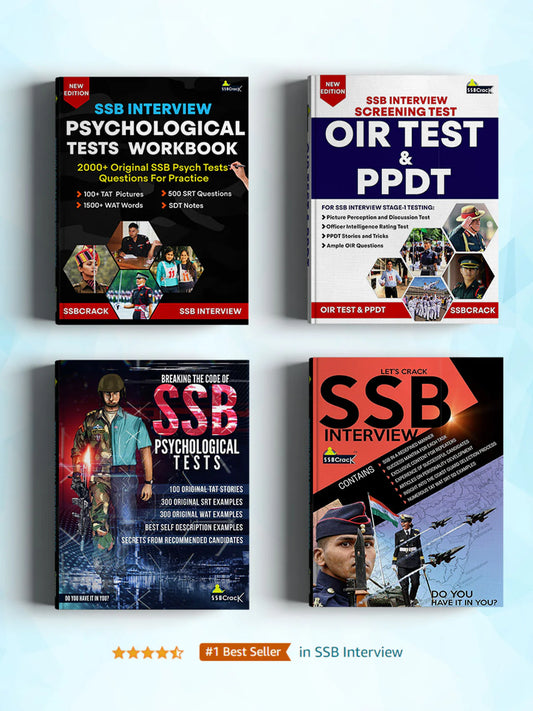
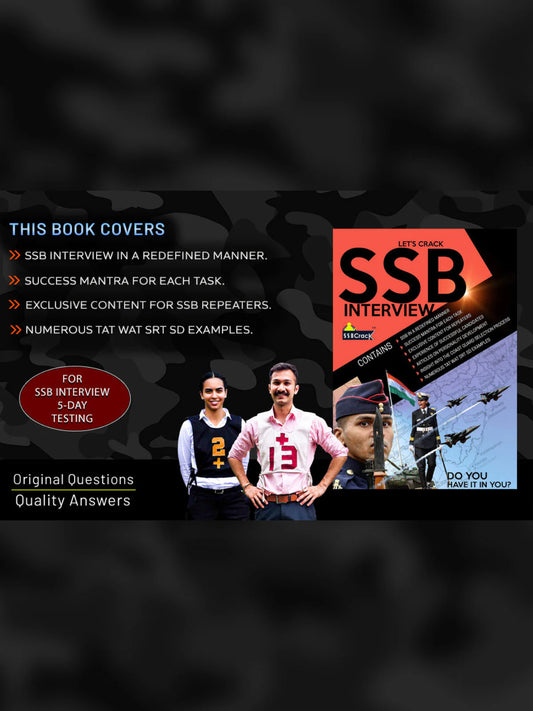
![Let's Crack SSB Interview Book [Paperback]](http://shop.ssbcrack.com/cdn/shop/files/ssb-books.webp?v=1736351621&width=533)
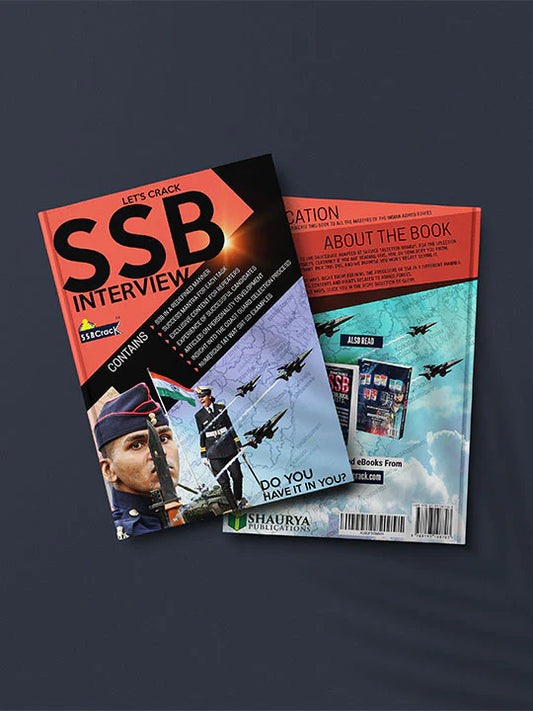
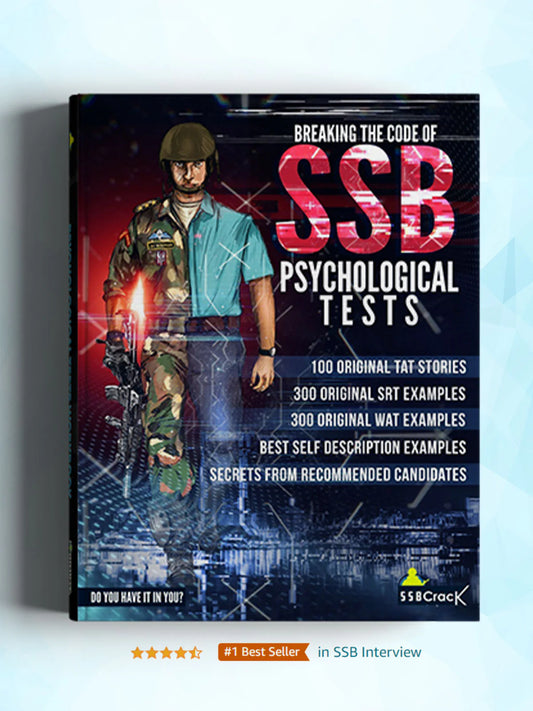
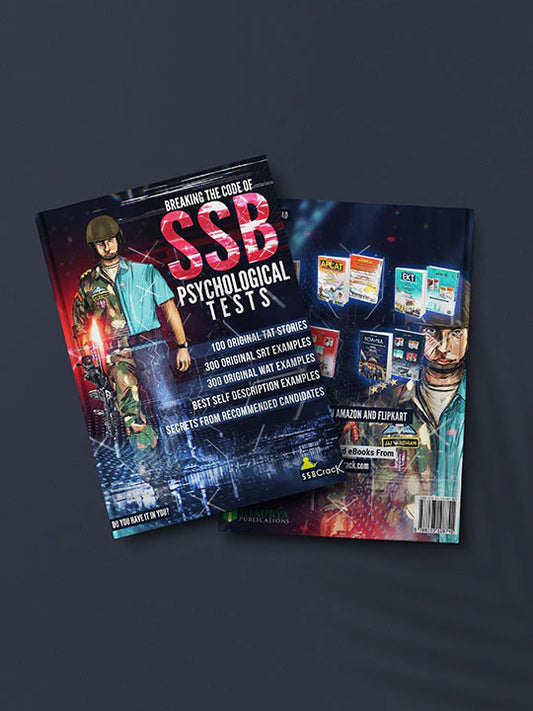
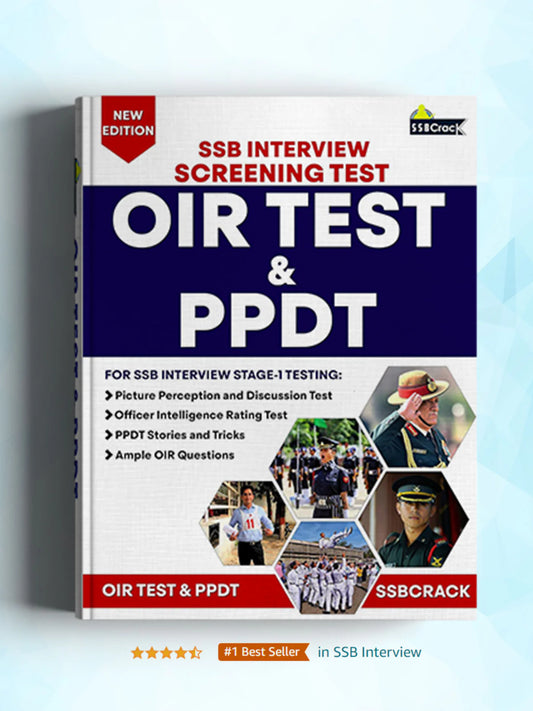
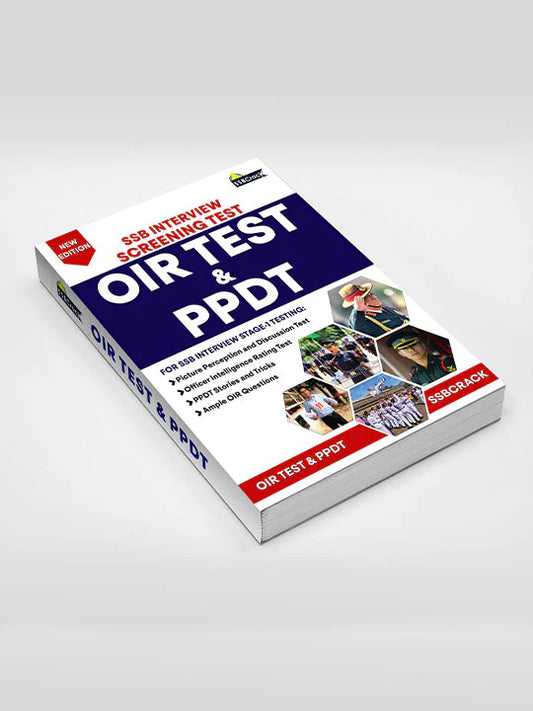
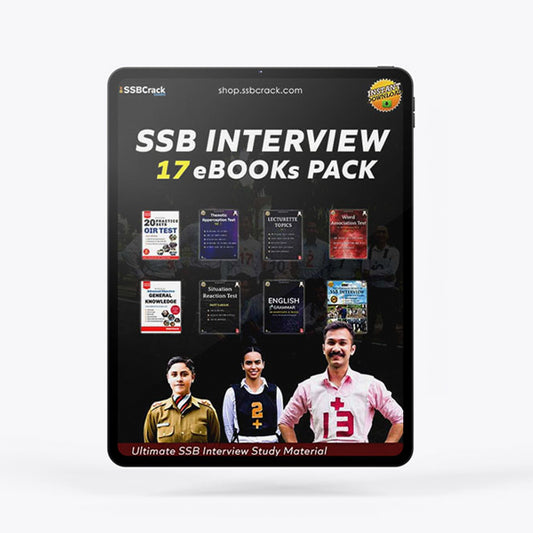
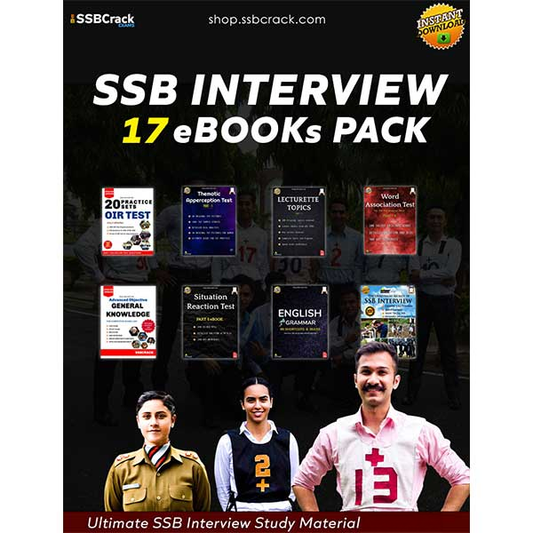
![Thematic Apperception Test (TAT) Part 1 eBook [100+ Stories]](http://shop.ssbcrack.com/cdn/shop/files/TAT-ebook-part-1-ssbcrack_051ae49c-43ea-4eb4-95c7-0fa0bfa2a639.jpg?v=1735540406&width=533)
